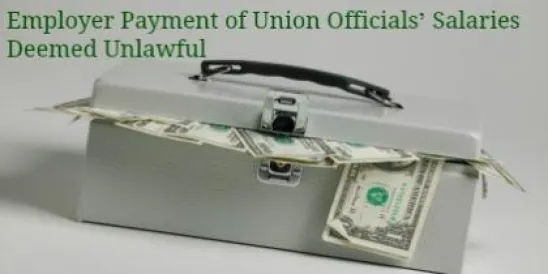Seventh Circuit breaks with long-relied-upon precedent, holding that wage payments to former employees on leaves of absence for union business violate section 302 of the LMRA.
On November 1, the U.S. Court of Appeals for the Seventh Circuit issued its decision in Titan Tire,[1] holding that Titan Tire could not lawfully pay the salaries of two former employees who were on leaves of absence from the company and working full time for the union. In so holding, the Seventh Circuit became only the third federal appeals court to consider the issue directly and the first to find such an arrangement unlawful. The Seventh Circuit explicitly disagreed with the rationale of the U.S. Court of Appeals for the Third Circuit in Caterpillar,[2] long viewed as the prevailing law in this area. This decision is particularly significant because the paid, full-time union leave arrangements at issue in bothTitan Tire and Caterpillar are not uncommon under mature collective bargaining relationships.
Background
The Titan Tire case arose after Titan unilaterally discontinued its practice of paying the union officials’ salaries in 2008, believing that the practice violated section 302 of the Labor-Management Relations Act (LMRA). After Titan stopped paying the salaries, the union officials filed a complaint against Titan, claiming the company’s actions violated various labor agreements. An arbitration award was subsequently issued in favor of the union, and Titan filed an action to vacate the award in federal court. The district court enforced the arbitration award and rejected Titan’s section 302 defense. An appeal to the Seventh Circuit followed.
LMRA Section 302
Section 302(a) of the LMRA broadly prohibits an employer from paying any money or other thing of value to any representative of its employees. Section 302 is a criminal statute enforced by the U.S. Department of Justice. The maximum penalty for a “willful” violation of section 302 is imprisonment for five years and a $15,000 fine.
The statute does, however, contain a series of exceptions, including one that covers certain employer payments to employees and former employees who are serving as union representatives. Specifically, section 302(c)(1) exempts the following:
[A]ny money or other thing of value payable by an employer to . . . any representative of [its] employees, or to any officer or employee of a labor organization, who is also an employee or former employee of such employer, as compensation for, or by reason of, his service as employee of such employer[.]
The courts in both Titan Tire and Caterpillar analyzed whether payments to former employees could be “by reason of” their prior service to the employer for purposes of section 302(c)(1).
The Seventh Circuit’s Decision
The Seventh Circuit in Titan Tire concluded that section 302(c)(1) did not cover the payments at issue. Relying heavily on the dissenting opinion inCaterpillar, the court explained that the payments must be “because of” the union officials’ prior service to the employer. The payments Titan Tire made, in contrast, were “because of” the union officials’ service to the union. Although the union officials had become eligible for the right to receive continued wage payments because of their service to the employer, the right to the payments themselves only arose once they began working for the union and, therefore, did not vest while working for Titan.
In its decision, the Seventh Circuit explicitly declined to adopt the analysis and conclusions of the Third Circuit in Caterpillar. In finding similar wage payments lawful, the Third Circuit relied heavily on the payments being provided for in a valid collective bargaining agreement. The Caterpillar majority, over two dissenting opinions, also found no valid distinction between union officials who worked full time performing union business and union officials who split their time working for the employer and the union and who continued to be paid pursuant to a no-docking arrangement. The Seventh Circuit was not persuaded, finding inclusion in a collective bargaining agreement irrelevant and concluding that no-docking arrangements are distinguishable. Notably, the U.S. Supreme Court granted certiorari in Caterpillar, but, after briefing and oral argument, the parties settled the case.
Larger Context of the Titan Decision
Titan confirms that litigation concerning the meaning and application of section 302 of the LMRA, which was passed in 1947, remains surprisingly active. The U.S. Supreme Court is poised to decide a landmark section 302 case in the coming term. This case involves a review of the U.S. Court of Appeals for the Eleventh Circuit’s decision in Mulhall v. UNITE HERE Local 355,[3] which held that a neutrality agreement with a union can be a “thing of value” that, if demanded by or provided to a union, could constitute a violation of section 302. In addition, a related labor law—the Labor-Management Reporting and Disclosure Act of 1959—has received considerable attention in the last several years because of proposed regulations that would expand employer and consultant reporting of so-called “persuader” activity in connection with union organizing and collective bargaining.
Practical Implications and Conclusion
Employers with contractual obligations or past practices involving the payment of union officials’ salaries while those individuals are not performing work for the employer should reconsider those obligations in light of the Titan decision. For employers operating in the Seventh Circuit’s jurisdiction, there now is clear precedent holding these arrangements unlawful under section 302. For employers elsewhere, the Seventh Circuit’s rationale is persuasive and may trigger renewed litigation in other circuits or ultimately a decision by the Supreme Court to resolve the circuit court conflict over the meaning of section 302 in this context.
[1]. Titan Tire Corp. of Freeport v. United Steel, Paper and Forestry, Rubber, Mfg., Energy, Allied Indus. & Serv. Workers Int’l Union, No. 12-1152 (7th Cir. Nov. 1, 2013), available here.
[2]. Caterpillar, Inc. v. Int’l Union, United Auto., Aerospace & Agric. Implement Workers of Am., 107 F.3d 1052 (3d Cir. 1997).
[3]. Mulhall v. UNITE HERE Local 355, 667 F.3d 1211 (11th Cir. 2012).





 />i
/>i
